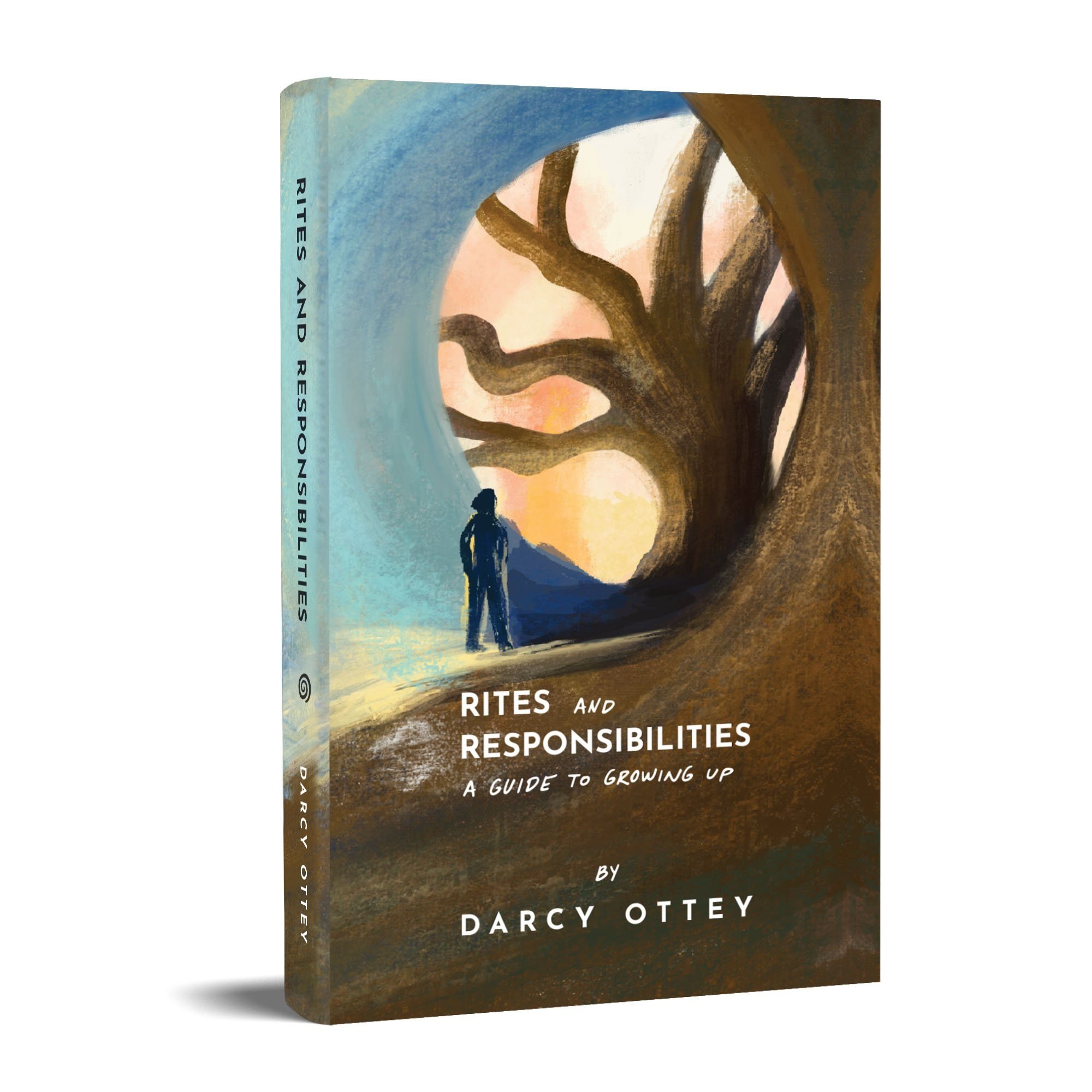
About the book

More than ten years in the making, this book introduces young people to rites of passage into adulthood: what they are; what they offer; how they came to be stolen, destroyed, or co-opted in most cultural traditions; and how young people take responsibility for their own rites of passage into adulthood today.
Rites and Responsibilities: A Guide to Growing Up
Who am I?
How do I fit in?
What is my purpose?
How can I actually make a difference?
Am I going to be okay?
These are some of the burning questions among young people today.
Even before COVID arrived on the scene, the pressures of social media, unprecedented debt, and global issues like climate change, political turmoil, and social injustice contributed to skyrocketing rates of anxiety, depression, and other mental health challenges in young people.
Despite these challenges and uncertain futures, today’s young people are at the forefront of cultural transformation.
This is where rites of passage come in.
Rites of passage can not only support youth to a healthier, more meaningful adulthood, but also help them channel their gifts, finding their place in multigenerational movements for change.

What are rites of passage?
Rites of passage are a set of diverse cultural practices designed to intentionally mark life transitions. Found in all cultures, they are fundamental to healthy development. They are also one of humanity’s most ancient psychological, social, spiritual, and cultural tools, helping young people to answer the questions driving them in this stage of life: who they are, how they fit in, and what they have to offer to the world around them.
Yet while some cultures and faiths still engage in initiatory rites, more frequently these ceremonies have been destroyed, driven underground, or commodified by colonialism and capitalism. This has left rites of passage as a relatively “fringe” concept in mainstream society.
In the absence of widespread understanding of the importance of rites of passage, young people need tools to support their own initiatory journey. Rites and Responsibilities: A Guide to Growing Up is one such tool.
History has shown that a surefire way to devastate a culture is to destroy its process of youth initiation, and to take over the education of young people. Regenerating cultural practices like rites of passage helps to restore community well-being and re-build resilient cultural landscapes.
Praise
“A compelling, comprehensive and comprehensible guidebook for young people who long for meaning, belonging, and a creative participation in the great work of our time: the slow, visionary work of building just, equitable, and life-enhancing cultures. A lifelong student and innovator of nature-based human development and cultural restoration practices, Darcy is among our best guides enabling younger generations to discover how they, individually and collectively, are uniquely made for these times.”
— Bill Plotkin, author of Soulcraft and The Journey of Soul Initiation
“Finally, an intelligent and comprehensive book that not only teaches, but guides young people, and adults, into the important understanding of the necessity of rites of passage for our youth today. It artfully bridges the many thousands of years in which most every culture offered this ceremony for the balance and health of their communities ... into our world today and its many serious challenges and cultural adjustments. Our youth are hurting, and struggling to find their place. We need to return this time honored earth-based wisdom to its place in human society.”
— Meredith Little, author of The School of Lost Borders: A Love Story and Co-Founder, School of Lost Borders
“The adage ‘the apple does not fall far from the tree’ could not be more appropriate than for what Darcy Ottey has contributed through Rites and Responsibilities: A Guide To Growing Up.
This timely youth development handbook is a product of ordeals, challenges, nurturing, guidance, and calling. There is no better time for this handbook than during this ‘moment of truth.’ It serves as an introduction for young people to rites of passage, their birthright and social and ecological responsibility. What Darcy has provided is a guide for the cultivation of a ‘new harvest’ that can assume responsibility for themselves, community and planet—the living and unborn!”
—Elder Paul Hill, Jr, National Rites of Passage Institute, East Cleveland, OH
“Darcy does an incredible job at exploring rites of passage, healing, purpose and sharing her experience with initiatory practices in this book. The healing practices found in this book have the capacity to not only change lives but even save lives. This is an incredible self healing and growth resource for anyone seeking to find purpose in their own lives and looking to connect deeper with the power that lies within them.”
— Arturo Quiros, Producer and Social Justice Advocate, Soul Felony Productions
“Rites and Responsibilities is going to help a lot of young people and adults, empowering them with tools to serve them on their journey toward healing for themselves and their communities: body, mind, heart, and spirit. Through sharing her own life experiences and the experiences of a number of young people, Darcy helps readers connect with the earth and all the healing that can come through this connection. At its core, that’s what this book is all about.”
— Sharon Blackwolf, Indigenous elder and former educator in the school system

The book’s unique approach
Intentional, community-supported rites of passage are rarely discussed in mainstream approaches to youth development. On the rare occasion that rites of passage do enter mainstream conversation, it’s typically under these conditions:
Adults talking to other adults about what young people need.
Described as something that exist only in Indigenous communities and small religious minorities (often framed in the past)
New-agey approaches disconnected from social justice movements
This book stands in contrast to all three.
-
By focusing on stories of initiation by and for young people, this book puts useful tools directly into the hands of young people, supporting them to take responsibility for their own healthy development. Though the author is now in her middle age, young people have been involved in every stage of the creation of this work.
Meanwhile, this book remains relevant for educators, youth workers, therapists, parents, and others that care about the healthy development of young people--as well as older adults who never received a meaningful initiation into adulthood.
-
Despite colonization’s attempts to eradicate cultural practices supporting young people on the road to adulthood, the truth is that there is a resurgence of rites of passage in communities around the world. Powerful efforts exist in all sorts of communities.
Through sharing stories of a broad range of young people growing up today, and bringing their identities, voices, and experiences to the forefront of the conversation meaningful, relevant rites of passage can be seen.
-
Traditional cultures around the globe have always understood how vital ceremony is to social and ecological well-being. That’s why so many have worked to preserve their rites of passage over centuries in the face of colonialism and genocide.
In a consumerist, capitalist-driven dominant culture that is rooted in exploitation of peoples and lands, preserving and regenerating healthy culture is inherently radical. To separate spirituality and self-development from social justice does a grave injustice to the cultural purpose of initiatory practices. My approach is grounded in a larger context of social and ecological justice.



